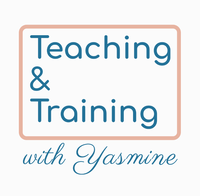- Home
- Teaching Specific
-
Training Specific
- Almost Everything You Need to Know About Being an Effective Trainer
- 9 Essential Skills & Training Tools for Trainers
- Training Needs Analysis
- The 9 Elements that Make Top Employee Training Programs So Successful
- How to Write a Lesson Plan for Corporate Training
- Training Checklists
- Books for Trainers
- Trainer, Facilitator, Presenter: What is the difference?
-
Where the Twain Shall Meet
- Ergonomics
- ESL Volunteer Tutor Guidelines and Expectations
- About Yasmine
- https://americanenglish.state.gov/
Lots of issue can cause interruptions in class or with a student's learning. How do you deal with common issues? During my research I found a goldmine-of-a-website, Search the topics below and click on the links. Whether working with adults or children, this information is invaluable.
Eberly Center-Teaching Excellence & Educational Innovation:
Select the problem that best matches your situation:Attitudes & Motivation
- Students come late to class.
- Students don't demonstrate critical thinking.
- Students lack interest or motivation.
- Students performed poorly on an exam.
- Students don’t seek help when needed.
- Students behave rudely in class.
- Students don’t participate in discussion.
- Students can't apply what they’ve learned.
- Students don't come to lecture.
- Students don’t keep up with the reading.
- Students respond to course content and classroom dynamics in emotional and unproductive ways.
- Students in studio-oriented programs aren’t motivated in non-studio courses.
- Students’ background knowledge & skills vary widely.
- Students don't demonstrate critical thinking.
- Students lack interest or motivation.
- Students don't know how to do research.
- Group projects aren’t working.
- Students can't apply what they’ve learned.
- Students can't write.
- Students don’t keep up with reading.
- Students’ background knowledge & skills vary widely.
- Students don't demonstrate critical thinking.
- Students don't know how to do research.
- Students can't apply what they’ve learned.
- Students can't write.
Cite
Eberly Center. “Teaching Excellence & Educational Innovation: Solve a Teaching Problem” Carnegie Mellon University. 2021. <https://www.cmu.edu/teaching//solveproblem/step1-problem/index.html> Accessed 07 May 2021.
Eberly Center. “Teaching Excellence & Educational Innovation: Solve a Teaching Problem” Carnegie Mellon University. 2021. <https://www.cmu.edu/teaching//solveproblem/step1-problem/index.html> Accessed 07 May 2021.
Other Helpful Websites
- 12 Teacher Strategies to Inspire Listening, Learning and Self-Control: Detention doesn’t work. Neither does criticism. Or yelling. In fact, they may actually aggravate and encourage a child’s defiance. What does work? These strategies for managing negative ADHD behavior in the classroom — and teaching students better skills for the long run. www.additudemag.com/slideshows/student-behavior-problems-in-the-classroom-teacher-tips/
- The Problem Trainee: How To Tackle Disruptive Behaviour During The Training Phase? allthingstalent.org/2019/07/11/problem-trainee/
- 15 Top Tips on Dealing With Disruptive Behaviour In Your Training Room phillyfuggle.typepad.com/trainingtools/2011/02/dealing-with-disruptive-behaviour.html


